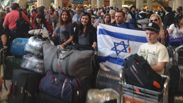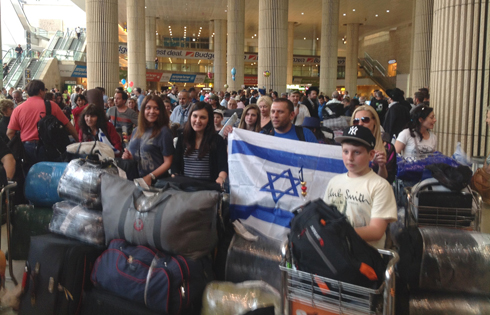
As tensions between Kiev and Moscow continue rising in eastern Ukraine, about 20 olim from Ukraine arrived at Ben Gurion Airport earlier this week.
Dozens of others are expected to arrive in the next two months as part of an operation organized by the Jewish Agency and the International Christian Embassy in Jerusalem (ICEJ).
"The situation in Ukraine is not good, I don't see a future there because of the tensions and because of the financial crisis," said 23-years-old Daria Gernovski, who made aliyah from Kiev.
Related stories:
- Donetsk leaflet: Jews must register or face deportation
- Ukraine Jewish leaders to Putin: No anti-Semitism, please leave
- IFCJ transfers $1 million to Ukraine Jews
Tatiana and Vladimir Kochen and their two children also made aliyah from Kiev. "The situation in Ukraine is complicated and very difficult," Vladimir said. "There's no security, the government is unstable and there's a fear violence could break out at any moment."
When the current crisis in Ukraine broke out, a sharp rise was noted in reports of anti-Semitic incidents against the Jewish community in the country.
The Jewish Agency reported that there was also a sharp rise in the number of people seeking to make aliyah, almost twice as much as in 2013.
In recent years, the ICEJ aided 115,000 Jews to emigrate to Israel, among them 42,000 from Ukraine.
Rabbi Avraham Wolff, who serves as the chief rabbi of Odessa and southern Ukraine and as Chabad's emissary to the city, said that since he began his mission to the country in 1992, he has not seen such a demand to emigrate to Israel.
"We experienced years of starvation and wars, and in all of those years I haven't heard so much talk about making aliyah as I do now," he told Ynet.
Seventy percent of Ukraine's Jewish community is currently considering emigrating to Israel. They flood the consulate there and ask for entry visas.
"It's a phenomenon the likes of which we haven't seen since the massive immigration from the Soviet Union in the early 90s. For several months now that the economy here is being crushed and the sense of security is at the lowest level it could get," Rabbi Wolff said.
Despite that, at the moment there's no direct effect on the Jewish community in the country, the rabbi said, as the Russians and Ukrainians are focused on their own rivalry.
"The city is at war and has turned into a ghost town," Wolff said of Odessa. "People are not leaving the house and there's a feeling of a blockade. We had to increase security with guards at Jewish-owned businesses, and add 50 guards to Friday prayers at synagogues in the city. This week, only 100 worshippers arrived (to prayer at synagogues) instead of 300. We also increased security at the Jewish university and schools, adding arms and patrols."
He added that "sparks of anti-Semitism" have begun and that "the Jewish governor and one of the mayoral candidates, who is also Jewish, are being blamed."
Rabbi Wolff said he hoped the anti-Semitism will stop at hateful talkbacks and not escalate to physical harm.
ICEJ executive director Juergen Buehler said that "the crisis in Ukraine caused the Jewish community in the country to feel less secure, so we acted quickly, as we normally do, to bring needy Jews who are in danger to their homeland. It is a great honor for us to recieve the first group returning home."
















